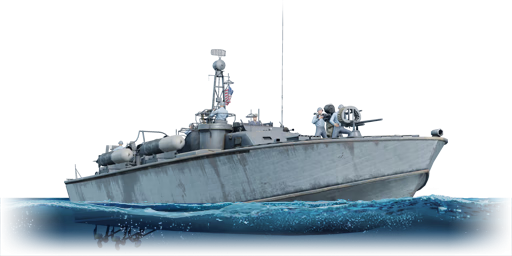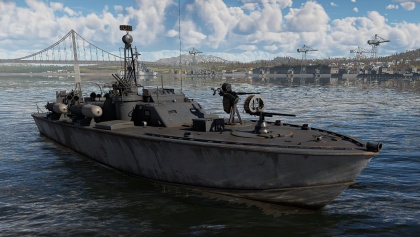Difference between revisions of "PT-314"
(Added comments to history section) (Tag: Visual edit) |
(→History: format) (Tag: Visual edit) |
||
| Line 95: | Line 95: | ||
== History == | == History == | ||
| − | + | PT-314 was laid down on 11 December 1942 and launched on 20 February 1943. PT-314 was in service from 11 March 1943 until sold on 23 June 1948. PT-314 served in MTB RON 5 in the South Pacific under Lt John W. Ewell. <ref>Steve Laroe, US PT Boats List: Squadron List, http://www.hazegray.org/</ref> | |
PT-314 was the lead boat in a class of 54 (314-367) built for the US Navy in 1943. | PT-314 was the lead boat in a class of 54 (314-367) built for the US Navy in 1943. | ||
| Line 117: | Line 117: | ||
{{ShipManufacturer Elco}} | {{ShipManufacturer Elco}} | ||
{{USA boats}} | {{USA boats}} | ||
| + | <references /> | ||
Revision as of 02:17, 3 November 2020
Contents
Description
The Elco 80 ft PT-314 is a rank III American motor torpedo boat
with a battle rating of 2.3 (AB/RB/SB). It was introduced in Update 1.79 "Project X" as part of the fleet closed beta test.
General info
Survivability and armour
Talk about the vehicle's armour. Note the most well-defended and most vulnerable zones, e.g. the ammo magazine. Evaluate the composition of components and assemblies responsible for movement and manoeuvrability. Evaluate the survivability of the primary and secondary armament separately. Don't forget to mention the size of the crew, which plays an important role in fleet mechanics. Tips for preserving survivability should be saved for the "Use in battle" section.
If necessary, use a graphic template to show the most well-protected or most vulnerable points in the armour.
Mobility
Write about the ship’s mobility. Evaluate its power and manoeuvrability, rudder rerouting speed, stopping speed at full tilt, with its maximum forward speed and reverse speed.
Armament
Primary armament
Provide information about the characteristics of the primary armament. Evaluate their efficacy in battle based on their reload speed, ballistics and the capacity of their shells.
Broadly describe the ammunition available for the primary armament, and provide recommendations on how to use it and which ammunition to choose.
Secondary armament
Some ships are fitted with weapons of various calibres. Secondary armament is defined by the weapon chosen with the control Select secondary weapon. Evaluate the secondary armament and give advice on how to use them. Describe the ammunition available for the secondary armament. Provide recommendations on how to use them and which ammunition to choose. Remember that anti-air armament, even heavy calibre weapons, belong in the next section.
Anti-aircraft armament
An important part of the ship’s armament responsible for air raid defense. Anti-aircraft armament is defined by the weapon chosen with the control Select anti-aircraft weapons. Talk about the ship’s anti-air cannons and machine guns, the number of guns and their positions, their effective range, and about their overall effectiveness – including against surface targets.
Torpedo armament
Many ships are armed with torpedo launchers, and for some vessels such as boats, torpedoes are an extremely important means of defeating an opponent. Evaluate the position of the torpedo launchers, discuss the ammunition available, firing specifics such as dead zones, features of the torpedoes themselves, etc.
Usage in battles
Describe the technique of using this ship, the characteristics of her use in a team and tips on strategy. Abstain from writing an entire guide – don’t get try to provide a single point of view, but give the reader food for thought. Talk about the most dangerous opponents for this vehicle and provide recommendations on fighting them. If necessary, note the specifics of playing with this vehicle in various modes (AB, RB, SB).
Modules
| Tier | Seakeeping | Unsinkability | Firepower | |||
|---|---|---|---|---|---|---|
| I | Dry-Docking | Tool Set | 40 mm HE clips | 20 mm HE | Anti-Air Armament Targeting | |
| II | Rudder Replacement | Fire Protection System | Smokescreen | 40 mm AP clips | 20 mm AP | Auxiliary Armament Targeting |
| III | Propeller Replacement | Primary Armament Targeting | ||||
| IV | Engine Maintenance | New Pumps | Artillery Support | |||
Pros and cons
Pros:
- Good firepower, can effectively engage both air and other sea targets
- Good mobility, with great top speed
- Armour is thin enough not to set off HE fuzes
- Relatively small target
Cons:
- Guns are awkwardly placed around the hull
- Thin armour means it's easily shredded even by the lighest caliber machine guns
History
PT-314 was laid down on 11 December 1942 and launched on 20 February 1943. PT-314 was in service from 11 March 1943 until sold on 23 June 1948. PT-314 served in MTB RON 5 in the South Pacific under Lt John W. Ewell. [1]
PT-314 was the lead boat in a class of 54 (314-367) built for the US Navy in 1943.
Media
An excellent addition to the article will be video guides, as well as screenshots from the game and photos.
See also
Links to the articles on the War Thunder Wiki that you think will be useful for the reader, for example:
- reference to the series of the ship;
- links to approximate analogues of other nations and research trees.
External links
Paste links to sources and external resources, such as:
- topic on the official game forum;
- encyclopedia page on ship;
- other literature.
| Electric Launch Company (Elco) Ships | |
|---|---|
| Patrol Torpedo Boats (PT) | |
| 77' PT | PT-20 · PT-59 |
| 80' PT | PT-103 · PT-109 · PT-174 · PT-314 · Thunderbolt (PT-556) · PT-565 |
| USA boats | |
|---|---|
| Motor torpedo boats | PT-3 · PT-6 · PT-20 · PT-71 · PT-103 · PT-109 · PT-174 |
| PT-200 · PT-314 · Thunderbolt (PT-556) · PT-565 · PT-658 · PT-810 · PT-811 · PT-812 | |
| Motor gun boats | Kim Qui · LCS(L)(3) · PT-59 · PTF-7 · USS Candid · USS Asheville · USS Douglas · USS Flagstaff · USS Tucumcari · USS Cyclone |
| Armoured gun boats | LCM(6) Zippo |
- ↑ Steve Laroe, US PT Boats List: Squadron List, http://www.hazegray.org/





